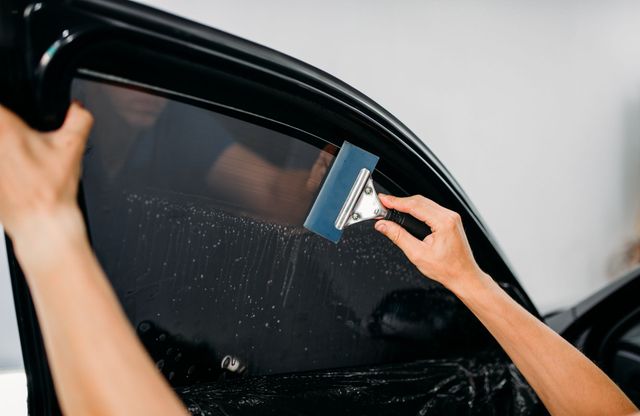How Moro Auto Spa Window Tinting Boosts Driving Comfort Anytime
How Moro Auto Spa Window Tinting Boosts Driving Comfort Anytime
Blog Article
Your Comprehensive Guide to DIY Home Window Tinting: Advice
Taking on a DIY window tinting project provides a chance to enhance both the functionality and looks of your area. Before getting started on this venture, it is vital to browse the complexities of local tinting laws and choose a proper film that aligns with your objectives.
Understanding Home Window Tinting Regulations
Navigating the elaborate landscape of window tinting laws is essential for any kind of do it yourself lover seeking to enhance their vehicle's aesthetic appeals and convenience. Each state in the united state has particular regulations regarding the allowed degrees of tint on numerous home windows, which can dramatically affect your decision-making process.
Generally, these legislations determine the maximum allowable Noticeable Light Transmission (VLT) percent, which describes the amount of light that can go through the tinted home windows. Some states allow just a certain percentage of color on the front windscreen, while permitting darker tones on back windows. Conformity with these laws is critical, as failure to stick can cause fines or the need to get rid of the color completely.
In addition, there are usually distinctions between passenger vehicles and industrial automobiles, with various regulations relating to each group. It's advisable to consult your regional Department of Motor Cars or comparable authority to collect specific info tailored to your area. Understanding these laws not just guarantees lawful conformity however also boosts security by preserving presence and avoiding possible threats while driving.
Selecting the Right Tint Film
Choosing the proper color movie is an important action in the DIY home window tinting procedure, as it directly influences both the look and functionality of your lorry's home windows. A number of aspects must direct your option, including the kind of movie, its legal compliance, and your preferred outcomes.
First, think about the different kinds of color films offered: colored, metalized, ceramic, and hybrid. Dyed movies supply a fundamental degree of personal privacy and warmth reduction yet might fade gradually. Metalized movies supply enhanced warm rejection and sturdiness however can interfere with digital signals. Ceramic films, while more pricey, provide superior warm resistance and UV protection without signal interruption.
Next, make certain that the film abides by local laws concerning visible light transmission (VLT) percentages. Compliance with these laws is essential to prevent penalties and guarantee security.
Essential Tools for Do It Yourself Tinting
Having picked the ideal color movie for your home windows, the following action entails gathering the required devices to make sure an effective installation. The main tools you will certainly require consist of an utility blade or a razor blade, which is necessary for reducing the color film to the wanted dimension. A squeegee is likewise important, as it assists get rid of air bubbles and ravel the film during application.

Moreover, think about making use of a warmth weapon or hairdryer, as this can assist mold the tint movie to the shapes of the home window and promote adherence. Gloves are recommended to avoid finger prints on the movie during installation. By gathering these important devices, you will be well-prepared to tackle your do it yourself home window tinting task efficiently.
Step-by-Step Application Refine
Begin by extensively cleaning the window surface to make certain ideal adhesion of the tint film. Utilize a glass cleaner and a lint-free towel to remove any kind of dirt, dirt, or grease. As soon as the window is tidy, gauge the color film versus the home window, allowing for a small overlap on all sides. Cut the film as necessary with a sharp energy blade for an exact fit.
Gently spray the home window surface area and the sticky side of the film. Thoroughly align the film with the top of the home window, guaranteeing it is directly. Use a squeegee to smooth the film, applying company, go to my site even pressure.
Allow the color to treat for at least 24 hours without rolling down the home windows. Follow these steps carefully for optimum results in your Do it yourself window tinting project.
Upkeep and Care Tips

It's a good idea to wait at least a week after installation prior to cleaning your windows to permit the adhesive to totally heal. Throughout this initial duration, stay clear of rolling down the home windows to stop any kind of damage to the tint.
Regular upkeep involves examining the edges of the color for any indications of bubbling or lifting. If you observe any kind of issues, it's best to resolve them quickly to avoid additional damage. Additionally, beware with making use of home window treatments, such as shades or curtains, as official site they can create warmth that could endanger the tint in time.
Final Thought
In final thought, undertaking a DIY home window tinting job requires careful consideration of local guidelines, option of appropriate color movies, and the utilization of necessary devices. An organized application process guarantees optimal results, while regular upkeep adds to the longevity of the color - Moro Auto Spa Window Tinting. By adhering to these standards, individuals can accomplish both aesthetic improvement and raised privacy in their rooms, making DIY home window tinting a useful undertaking
Report this page